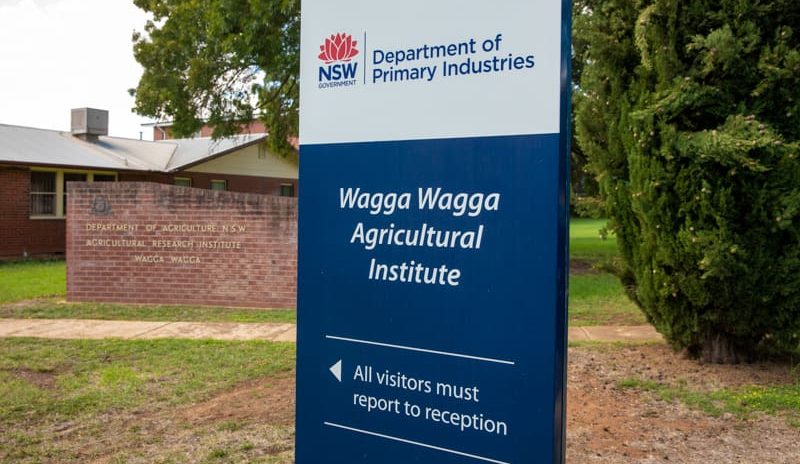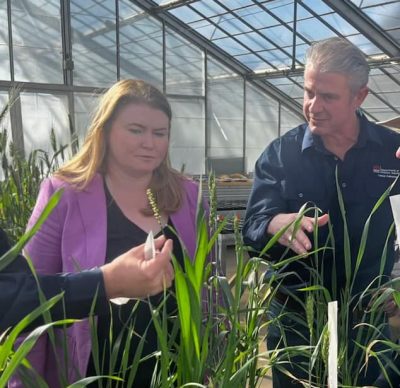
A NEW plant-breeding method discovered by a team at the New South Wales Department of Primary Industries and Regional Development is set to accelerate the process and fast-track the development of varieties with increased pathogen resistance.
To mark the achievement, NSW Minister for Agriculture Tara Moriarty last month visited the Wagga Wagga Agricultural Institute to see trials that have demonstrated the ability of the new breeding technology.
The discovery, made by senior plant pathologist Andrew Milgate and his team, is patent pending, with the team now calling for expressions of interest to commercialise the technique and conduct further research.

NSW Minister for Agriculture Tara Moriarty and Andrew Milgate inspect plants. Photo: Tara Moriarty
Dr Milgate said finalising the patent process will be “a significant achievement” for the department and will hopefully help the methodology “create the biggest impact” for NSW.
He said the methodology combines two different methods of inoculating plants, and uses the information gathered to obtain more data on a plant’s defense responses.
He said this allows researchers to “categorise those resistance genes in a new way and opens the possibility of combining resistance genes that we know are interacting with pathogens at different stages of the infection process”.
Dr Milgate said the development of this simple methodology and will result in a significant decrease in time needed to understand a plant’s resistance genes.
“It normally takes five or ten years of research into a resistance gene that has already been identified to actually get to the point where you know or have a level of confidence on how the pathogen is interacting with the plant,” Dr Milgate said.
“The method that we’ve developed means that we are able to do that in a matter of months.”
Ms Moriarty said the discovery showcases the research and development work under way by the primary industries team.
“This exciting breakthrough in plant-breeding technology highlights the NSW Government’s commitment to undertake research and development that maximises outcomes for NSW agriculture,” Ms Moriarty said.
“The new technology will enable industry to adopt disease-resistant crop varieties faster and easier, resulting in increased profitability and productivity for our growers.”
All crops to benefit
Under the patent, which will be formalised in the coming months, the methodology can be applied to all plants and fungal pathogens, including broadacre, horticulture and tree crops and aquaculture and medicinal plants.
“There is no limit as to the potential benefit that can be derived from the method because we have demonstrated it in a wide variety of plant species and a wide variety of fungal pathogens,” Dr Milgate said.
“It’s a very simple discovery that will hopefully have great benefits for advancing breeding for resistance to pathogens across all crops.”
Dr Milgate said his team at the Wagga Wagga facility primarily focuses on wheat and barley research, with the team required to gather material and test the technique on a wide variety of plant material.
“We had a busy 12 months collecting samples from Queensland to Tasmania trying to find diseased plants from different types of crops to have the resources to do testing on as many pathogens as possible.”
Commercial partnerships
Dr Milgate said the team was looking forward to working with breeding companies or other private researchers to further develop the technique.
“There is a lot more research to be done on the method and that is part of what the expression of interest is about, as well as finding partners to now take it to the next level.”
He said the method was “breeder friendly” and could “be adopted by breeding companies in selecting for resistance in their programs with little or no adaptation of their existing infrastructure”.
He said the project would also offer new opportunities for his team regarding furthering “public-private partnerships”.
“It is a slightly different model to what we ordinarily operate under but it’s something we are keen to explore as another aspect to our portfolio of options of how we get our research done.”
Grain Central: Get our free news straight to your inbox – Click here

HAVE YOUR SAY